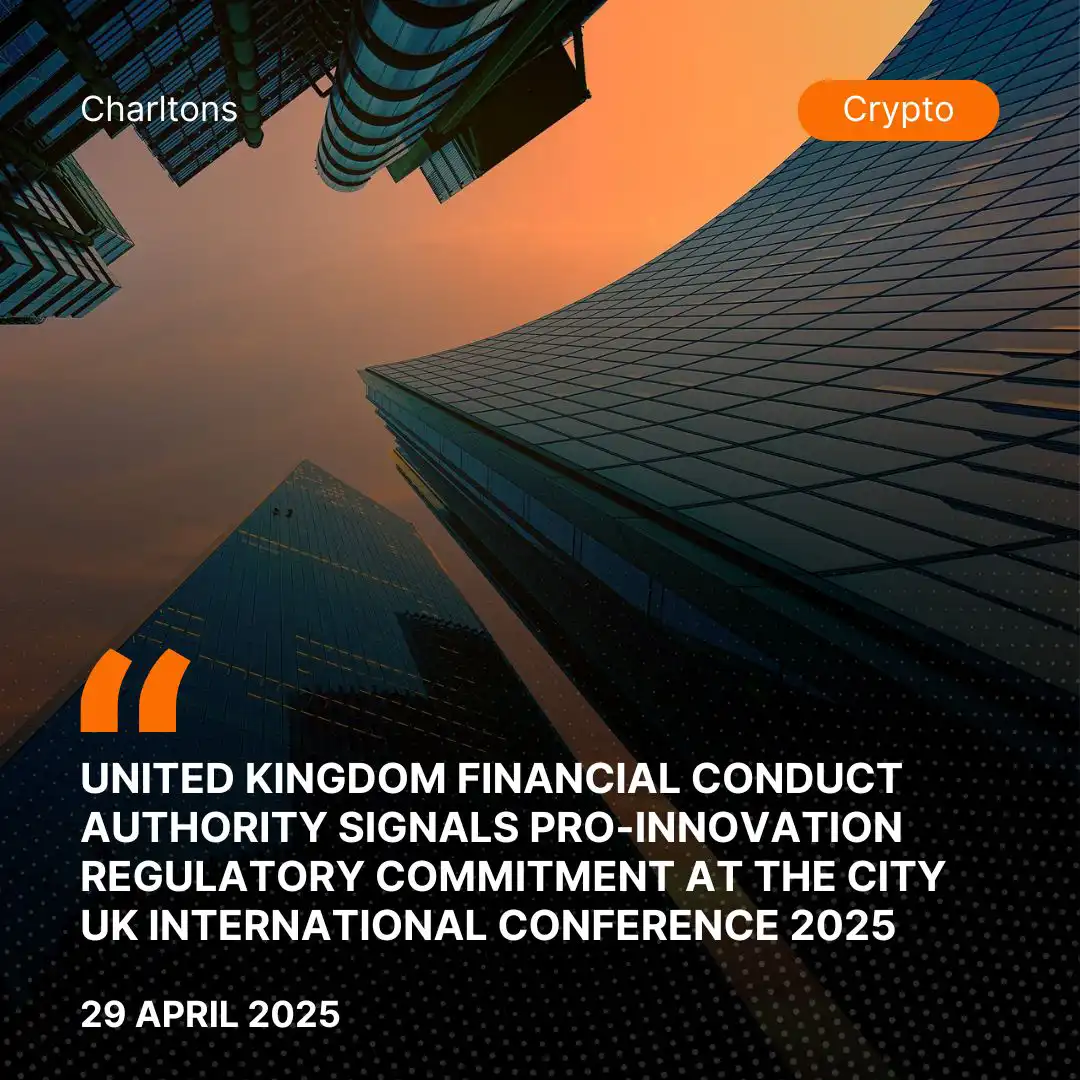
On 24 April 2025, Jessica Rusu, Chief Data, Information and Intelligence Officer at the United Kingdom Financial Conduct Authority (UK FCA), delivered a Speech at ‘The City UK’ International Conference 2025, outlining the FCA’s evolving approach to digital asset regulation, artificial intelligence, financial innovation, and regulatory modernization. Against the backdrop of global market uncertainty, Rusu positioned the United Kingdom as a steady and trusted financial centre — offering the clarity, stability, and proportionate regulation that innovative firms require to start up, scale, and thrive.
Opening her remarks with reflections on the resilience of financial markets during volatile times, Rusu highlighted how technological advancements, particularly artificial intelligence, have fundamentally reshaped the financial services sector in the past year. She noted that the United Kingdom remains a global leader in key markets such as commercial insurance, derivatives, debt issuance, foreign exchange, and commodities trading. Underpinning this leadership is a world-class outcomes-based regulatory regime that balances market dynamism with systemic stability.
Rusu elaborated on the United Kingdom Financial Conduct Authority’s new five-year strategy, launched just weeks before the conference, which focuses on deepening trust, recalibrating risk management, and supporting sustainable economic growth. She argued ‘Entrepreneurs, seek predictability and regulatory certainty, and the UK FCA is committed to providing an environment that is pro-innovation, stable, and globally competitive’.
Rusu also discussed on the nation’s strong rule of law, business-friendly climate, and effective collaboration between Government, Parliament, regulators, and industry stakeholders. The country’s leadership in fintech is evident, with three times more fintechs than Germany or France, dozens of unicorns, and a healthy pipeline of high-growth “soonicorns”. These achievements, she said, are supported by pioneering initiatives like the world-first Regulatory Sandbox and the more recently launched Digital Sandbox, which now includes an AI Lab offering synthetic data assets for innovation testing.
Rusu shared tangible metrics demonstrating the success of the FCA’s innovation platforms. More than 90% of firms engaging with the FCA’s Innovation Services proceed to authorisation, and over 80% of firms that participated in the Regulatory Sandbox remain operational. Sandbox firms are not only surviving but thriving, being 50% more likely to raise funding and typically securing 15% more investment than peers.
Turning to digital asset regulation, Rusu acknowledged the accelerating pace of innovation in payments, digital assets, stablecoins, and crypto markets, particularly in the United States. She reiterated the United Kingdom’s intent to capitalise on opportunities in distributed ledger technology (DLT) and tokenisation, responding to calls from TheCityUK’s recent report advocating urgency in modernising the UK’s financial market infrastructures. Following the Government’s approach to crypto regulation, the United Kingdom Financial Conduct Authority published a comprehensive roadmap for developing a domestic crypto regime in late 2024. Rusu underlined that the FCA has already leveraged existing legislation, such as the Financial Services and Markets Act 2000, to impose robust standards and consumer protections in the crypto market. In the first year of its financial promotions regime, the FCA removed over 900 scam crypto websites and issued 1,700 consumer alerts.
She made it clear that the FCA is not operating in isolation, highlighting the United Kingdom’s active participation in international standard-setting bodies like IOSCO, the Financial Stability Board (FSB), and the Financial Action Task Force (FATF). By engaging internationally, the United Kingdom ensures that its domestic regulations remain competitive while influencing the global evolution of digital asset standards.
Beyond crypto, Rusu pointed to the transformative potential of Open Banking and Open Finance, noting that over 11 million consumers already use Open Banking services in the United Kingdom. She detailed efforts to expand Open Banking to new payment models, including variable recurring payments, and underscored initiatives like ‘Project Aperta’ — a collaboration with the Bank for International Settlements to develop cross-border data sharing frameworks that could reduce friction and cost in global finance.
Artificial intelligence featured prominently in Rusu’s vision for the future of financial services. With the UK FCA’s AI Lab now operational, the agency has embraced an “open for AI business” approach. She cited findings from a joint survey with the Bank of England showing that 75% of firms are already deploying AI solutions, with another 10% planning adoption. The UK FCA’s existing outcomes-based regulation, including the Consumer Duty and the Senior Managers and Certification Regime (SM&CR), offers the agility needed to manage risks emerging from AI technologies. Rusu stressed that the UK FCA’s AI Lab acts as a supercharged innovation space capable of testing cutting-edge GenAI (Generative Artificial Intelligence) applications.
Focusing on regulatory reform, Rusu detailed the United Kingdom Financial Conduct Authority’s ambitious efforts to streamline wholesale market regulation, overhaul listing and prospectus rules, and launch innovative capital market systems like PISCES (Private Intermittent Securities and Capital Exchange System). The UK FCA has also slashed capital regulatory burdens by 70% and introduced a pre-application support service (PASS) for wholesale, payments, and crypto firms, dramatically easing the pathway to authorisation.
Highlighting the drive toward a more user-centric regulatory system, Rusu outlined steps the UK FCA has taken to digitise interactions, simplify authorisation forms, decommission legacy data returns, and move toward a machine-readable version of the UK FCA Handbook. The new ‘My FCA’ portal consolidates data submissions, fee payments, and communications in one place, while AI-driven enhancements to the supervision hub have improved real-time guidance and consumer service redirection.
In closing, Rusu left delegates with three core messages: that the United Kingdom remains the best place globally to scale and grow businesses, that the United Kingdom Financial Conduct Authority is fully open for AI and digital asset innovation, and that the UK FCA’s proportionate and agile regulatory model is a global game-changer for modern finance.
(Source: https://www.fca.org.uk/news/speeches/global-responses-digital-asset-regulation)





